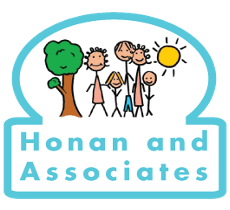Procedure for Child Psycho-Educational and Diagnostic Assessment
Before the Office Appointment:
- You will be provided with a Consent Form to review, complete, sign and send into the office by post or email.
- Prior to meeting you or your child, we will be requesting some specific information from yourself and the school/preschool, and reviewing all documents you organize for submission to us. This helps to determine the specific components of the assessment.
- We will also send out some test forms to be completed by you and teacher(s) prior to the office appointment.
- For pre-school and primary school children a school observation will be arranged. Your child and the other students are not informed of who we are there to observe. The children are used to people coming and going in their classrooms and hardly pay any mind. Please do NOT tell your child someone is coming to the school to observe them or coach them in any way whatsoever on the day. It’s important that we observe them as they are typically in class and play yard. The time involved for this component of the assessment is typically 1-1.5 hours. These observations are scheduled at a time of the day to include classroom instruction time and yard time and a consult with school staff. If your child is not in school, we may suggest a home visit and have you insure there is at least one peer present so we can observe the quality of interaction.
- Questionnaires returned from parents and teachers will be scored and the information received will guide the planning for the office session.
- The lead Psychologist will organise the office part of the assessment date with you directly via email.
The day of the office assessment:
- You will come to the office with your child to meet with the Psychologist/s. There will likely be an Assistant Psychologist or a Doctoral Psychology Trainee present for note-taking.
- The appointment will consist of a full psych-educational assessment and a diagnostic interview based on the information and test results gathered to date. Relevant assessment tools, including the Diagnostic & Statistical Manual that is used by Mental Health practitioners, guide the interview.
- The beginning of the session is casual, allowing time for your child to get comfortable.
- The Psychologist will review the purpose of the day and what will happen in the session.
- During the office visit, which will be approximately 3 hours, you will meet with the Psychologist conducting the diagnostic interview, and after time with both parents and child, your child will go to the adjoining room for formal testing. You will remain to participate in a full discussion so that diagnostic queries can be explored. You will, at the close, be given our impressions and some initial recommendations though test scores (I.Q., academic, etc.) won’t be available that day. It’s not unusual to have the child return to complete the testing but parents do not have to stay for this.
- Typically we provide our impressions on the day. In some cases, we require additional time to analyse all of the data prior to giving a definitive diagnosis (or not).
After the office session(s):
- A formal written report is produced which analyses the test results to identify the child’s learning pattern; strengths and weaknesses; and also delineates the information gathered beforehand, during the observations and interviews, to support any conclusions drawn. We also include relevant individualized recommendations. We spend considerable time on this as it represents your child so we want it to be as accurate and useful as possible.
- An office or zoom session to provide feedback and discuss assessment outcome is arranged on request. The report will then be sent to you in pdf format for you to review for accuracy and once you provide any necessary feedback, it will be finalised for you to distribute as needed. On request, the clinical report can be modified for submission to the school, i.e. an alternative copy with sensitive family information excluded.
HONAN PSYCHOLOGICAL AND BEHAVIOUR ANALYTIC SERVICES LTD
